Backyard buffet
Provide for wildlife when planning a garden and the birds will not only reward you with their beautiful presence, they’ll also help to keep the garden free of slugs, snails and other insect pests. Trees filled with birdsong can even increase a property’s value.
The most reliable way to attract birds is to provide them with places to nest and shelter and a good supply of food. In winter their usual diet of nectar, fruit, berries and bugs is not as plentiful as it is at other times of year. So it makes good sense to bolster this winter food supply in your garden if you want birds to stick around.
The birds you attract will depend on the food you make available. A garden filled with the right kinds of New Zealand native trees and shrubs is like a five star hotel for native birds.
Bright flowering kowhai, kakabeak, pohutukawa and rata are leading favourites for nectar seeking birds, but arguably the most favoured of all for honey seeking tui is the towering flax flower. But in mid winter, before these natives come into bloom, Australian banksias and bottlebrushes are eagerly visited by tui and other nectar seeking birds.
Karo (Pittosporum crassifolium) and kohuhu (Pittosporum tenuifolium) also attract birds with their deep red scented flowers. Corokias and coprosmas provide gourmet treats
in the form of delicious red berries. These quick growing natives provide habitats for birds while slower trees reach maturity. They also offer shelter and comfortable backyard privacy for humans to enjoy.
Informality and variety wins hands down over neat minimalist landscaping when it comes to attracting a wide range of visitors. Planting layers of trees and shrubs with different heights and growth habits encourages a diversity of habitats for the different types of birds and the insects they like to feed on.
Allow leaf litter to accumulate beneath the trees to attract more insects for birds to feed on.
Your feathered friends won’t judge you for having a messy garden, in fact they prefer it. Consider giving a corner of your garden over to a wild zone especially for birds to use for nesting – a maintenance-free haven that you visit purely to enjoy nature!
NZ native food plants for NZ native birds
| Common name | Botanical name | Food for birds |
| akapukaea (Three Kings vine) | Tecomanthe speciosa | nectar |
| harakeke and wharariki (flax) | Phormium species | nectar |
| horoeka (lancewood) | Pseudopanax crassifolius | fruit and seeds |
| karaka | Corynocarpus laevigatus | fruit and seeds |
| karamu, mingimingi | Coprosma species | fruit and seeds |
| karo, tarata, kohukohu | Pittosporum species | nectar |
| kawakawa | Macropiper excelsum | fruit and seeds |
| kohia (NZ passion vine) | Passiflora tetrandra | fruit |
| korokio, hokataka, whakataka | Corokia species | fruit and seeds |
| kotukutku | Fuchsia excorticata | nectar and fruit |
| kowhai | Sophora varieties | nectar |
| mahoe (whiteywood) | Melicytus ramiflorus | fruit and seeds |
| makomako (wineberry) | Aristotelia serrata | fruit and seeds |
| nikau | Rhopalostylis sapida | fruit and seeds |
| pohutukawa | Metrosideros excelsa | nectar |
| puriri | Vitex lucens | nectar and fruit |
| rata | Metrosideros robusta | nectar |
| rewarewa | Knightia excelsa | nectar |
| rimu | Dacrydium cupressinum | fruit and seeds |
| ti kouka (cabbage tree) | Cordyline australis | nectar, fruit |
| titoki | Alectryon excelsum | fruit and seeds |
| totara | Podocarpus totara | fruit and seeds |
| whauwhaupaku (five finger) | Pseudopanax arboreus | fruit and seeds |

3-Jun-2019
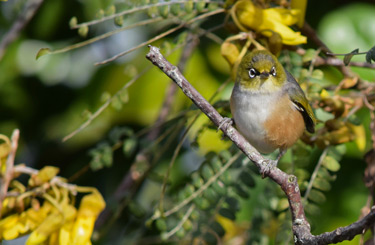
Tauhou (Silvereye) on kowhai
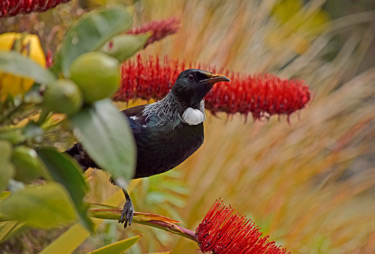
Tui on Poor Knights Lily (Xeronema callistemon)
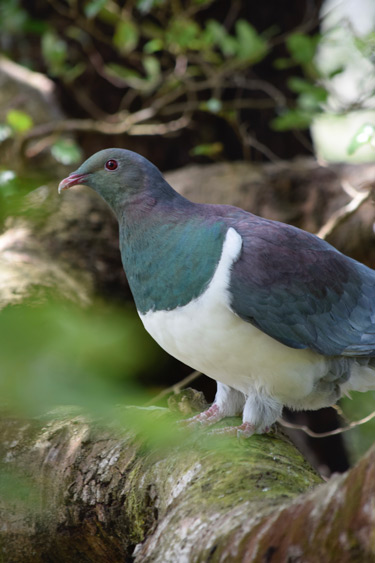
Kereru (wood pigeon)
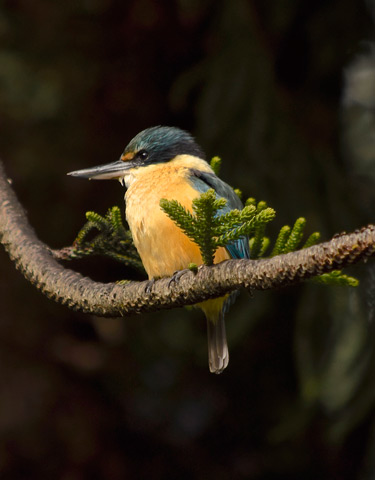
Kotare (kingfisher)
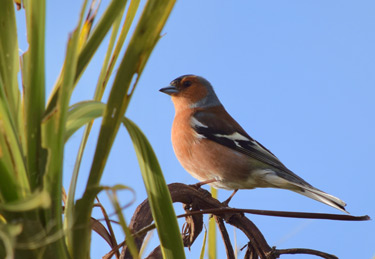
Chaffinch

